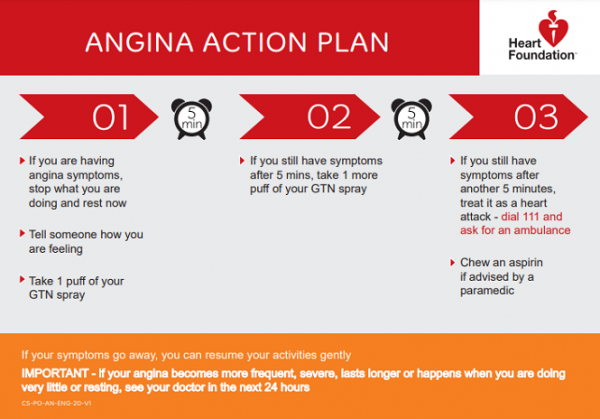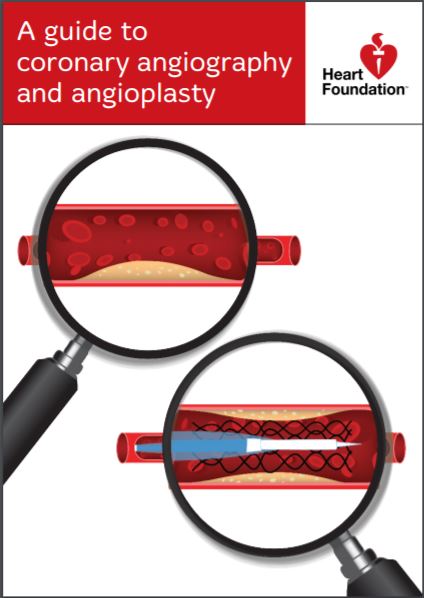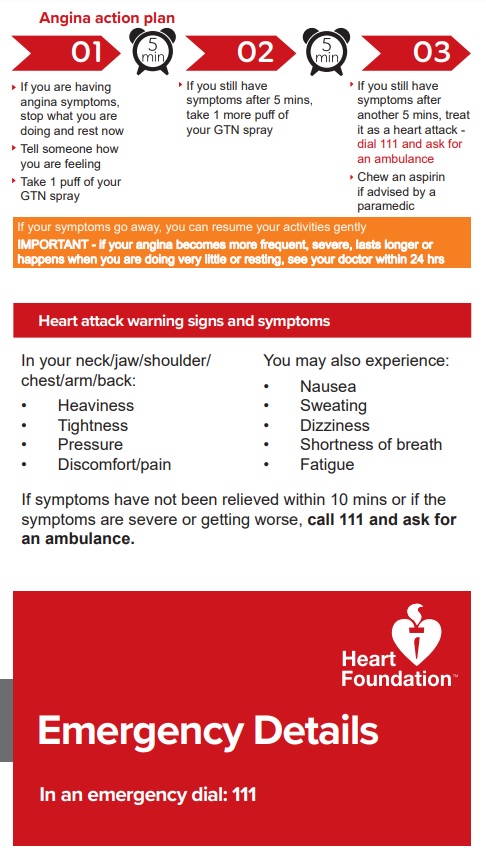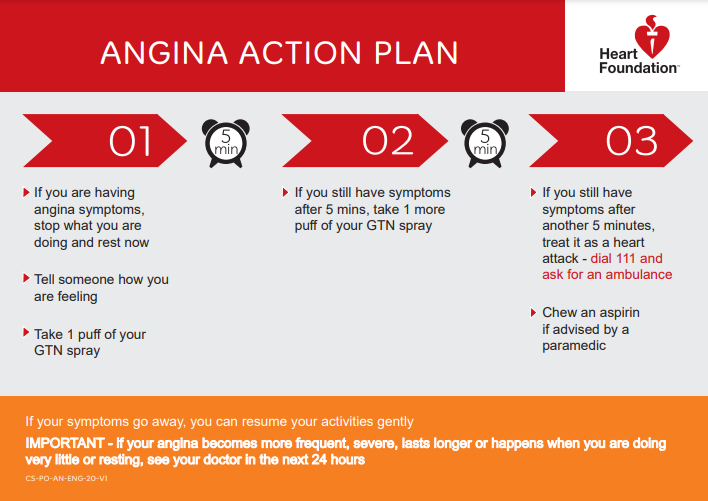Angina
Key points about angina
- Angina is chest pain that occurs when the blood supply to the muscles of your heart is restricted.
- This may be felt as an unpleasant feeling, tightness, pressure or weight on your chest and sometimes a feeling of breathlessness.
- While it's not usually life-threatening, it is a warning sign that you could be at risk of a heart attack or stroke.
- It usually only lasts a few minutes and can be relieved by rest and/or medicine.
- If your angina is not relieved after rest and 2 doses of your medication 5 minutes apart, after another 5 minutes call 111 and ask for an ambulance immediately.

| Could it be a heart attack? |
|---|
| If your angina is not relieved after rest and 2 doses of your medication 5 minutes apart, after another 5 minutes call 111 and ask for an ambulance immediately. |
| Action plan for if you have an angina attack |
|---|
|
|
Create your own angina action plan(external link)(external link) Heart Foundation, NZ |

Image credit: Heart Foundation NZ
Video: What is angina?
This video may take a few moments to load.
(British Heart Foundation, UK, 2019)
In most cases, angina is caused by coronary artery disease. This is a condition that occurs when fatty deposits build up in blood vessels supplying blood to your heart muscle. This is called atherosclerosis.
Things that can increase your risk of atherosclerosis include:
- getting older
- an unhealthy diet
- a lack of exercise
- being overweight
- regularly drinking excessive amounts of alcohol
- smoking
- other conditions, including high blood pressure, high cholesterol and diabetes
- a family history of atherosclerosis or heart problems.
The main symptom of angina is chest pain.
- The pain may feel tight, dull or heavy and is usually felt across the centre of your chest.
- It may also be felt in either or both shoulders, your neck or jaw, down one or both arms and in your hands.
- Some people experience it in only one of these areas and not in the chest at all.
- Angina is usually brought on by physical exertion or stress.
- Angina usually stops within a few minutes of resting or taking angina medicines.
Angina can also cause breathlessness, feeling sick (nausea), pain in your lower chest or belly that is similar to indigestion and fatigue. Women and older people are more likely to present with these symptoms. Some people have these symptoms without obvious chest pain.
Angina may also occur at rest or even during the night. It can often be experienced at particular times of the day, eg, first thing in the morning or late afternoon.
Regular pattern of angina symptoms
If you get angina at predictable times (eg, in cold temperatures, walking up hills, while mowing lawns or showering, during sexual activity or at work), use your GTN spray or tablets a few minutes before doing that activity. If you are experiencing angina symptoms every day, see your doctor so that further treatment can be planned.
Change in angina symptoms
See your doctor within 24 hours if the pattern of your angina symptoms changes significantly in one or more of the following ways: frequency, severity, more prolonged, when you're doing very little or are resting. Continue to use your medicine in the meantime.
|
Angina |
Heart attack |
|
|
|
|
|
|
| If your angina is not relieved after rest or 2 doses of your medication in 10–15 minutes call 111 and ask for an ambulance immediately. |
|---|
See your GP if you have had an episode of chest pain or are concerned about angina. They may ask about:
- your symptoms – what you experienced and when it happened
- your lifestyle, eg, what your diet is like and whether you smoke
- whether heart problems run in your family/whānau.
They may also measure your:
- blood pressure
- weight
- blood levels of glucose and cholesterol.
If they think you might have angina, they may refer you to hospital for testing.
Tests in hospital
To check if you have angina and assess your risk of more serious problems like heart attacks or stroke you may have:
- an electrocardiogram (ECG) – to check your heart's rhythm and electrical activity
- an exercise ECG – recorded while you are exercising on a treadmill or stationary bike to assess your heart's response to stress or exercise
- a coronary angiography – a procedure that uses a special dye (contrast material) and x-rays to see how blood flows through the arteries in your heart
- blood tests.
Your treatment depends on the type of angina you're diagnosed with.
There are 2 main types of angina:
- stable angina (the most common type) – attacks have a trigger (such as exercise) and improve with medicines and rest
- unstable angina (the more serious type) – attacks are more unpredictable and can continue despite resting.
If you have stable angina, you will be given medicines to treat attacks when they occur and reduce the risk of further attacks. If you have unstable angina, you will need medicines to prevent blood clots and reduce your risk of having a heart attack or stroke.
A combination of medicines and healthy lifestyle can help stop angina attacks and reduce the risk of further problems like heart attacks.
- You may need to take several medicines to control your angina.
- Adopting a heart-healthy lifestyle will help prevent further damage.
- Surgery may be recommended if medicines and lifestyle changes don't help.
Medicines for angina
There are a variety of medicines for angina, which work in different ways. Medicines are used together with healthy lifestyle choices such as eating a healthy balanced diet, maintaining a healthy weight and exercising regularly.
The following are examples of the medicines used to ease and prevent chest pain and reduce your chances of further heart problems. Not everyone with angina will be prescribed the same medicines. Your doctor will prescribe the medicines that work best for you.
Medicines to ease chest pain
GTN spray (also called glyceryl trinitrate spray)
GTN spray is used to ease chest pain and provides rapid relief from angina symptoms. It is sprayed under your tongue for quick onset.
- GTN spray works by widening blood vessels, letting more blood and oxygen reach your heart, which reduces strain on it and makes it easier for it to pump blood.
- It can also be used if angina pain is expected to happen, such as before exercise that is likely to cause chest pain (eg, before climbing stairs).
- Read more about GTN spray.
Medicines to prevent angina
The following are examples of medicines used to prevent chest pain and angina symptoms from happening. They must be taken every day on an ongoing basis.
- Beta-blockers such as metoprolol and carvedilol reduce the work your heart has to do, so it needs less oxygen and in this way they prevent angina. Read more about beta-blockers.
- Calcium channel blockers such as amlodipine or felodipine are used when beta-blockers are not suitable, such as for people with asthma, COPD or diabetes. Read more about calcium channel blockers.
- Isosorbide mononitrate works by widening blood vessels, letting more blood and oxygen reach your heart, which reduces strain on it and makes it easier for it to pump blood. They can be used when beta-blockers or calcium channels are unsuitable or can be used in combination with these if they are not working well enough. Read more about isosorbide mononitrate.
Medicines to reduce further heart problems
People with angina are at high risk of having serious heart problems such as a heart attack. To reduce your risk of heart problems and stroke, your doctor may prescribe the following medicines:
- medicines to lower your cholesterol such as statins
- blood thinning medicines that reduce the chance of blood clots developing such as aspirin
- medicines to control your blood pressure.
Read more about medicines used for heart problems.
A healthy lifestyle to help prevent further heart damage
Angina is a sign that your heart is not healthy. Medicines and surgery can help with symptoms but are not a cure for heart disease. The best way to help prevent further damage is to make healthy lifestyle changes.
To improve your heart health:
- cut down on saturated (animal) fats and salt
- eat more fruit, vegetables and wholegrain cereals
- do not smoke
- have your blood pressure checked regularly
- enjoy regular physical activity
- maintain a healthy bodyweight
- develop ways to cope with stress.
Even a small change can have a positive impact on your risk of heart attack and stroke. The more you change, the better for your health.
Learn more about:
- Stopping smoking
- Exercise and physical activity
- Eating and drinking for a healthy heart
- Reaching a healthy weight
- Managing stress
- Taking medications
- Complementary or traditional therapies
Surgery for angina
If medicines and lifestyle changes aren't helping control your angina, or if you have unstable angina, surgery may be recommended.
The 2 main types of surgery for angina are:
- coronary artery bypass surgery (CABG) – a section of blood vessel from another part of your body is used to re-route blood around a narrowed or blocked artery
- percutaneous coronary intervention (PCI) – widening of a narrowed section of artery by use of a stent (a tiny piece of tube).
An x-ray of the coronary arteries (coronary angiography) is used to decide whether CABG or PCI is appropriate.
Apps reviewed by Healthify
You may find it useful to look at some Quit smoking apps, Nutrition, Exercise and Weight management apps, Blood pressure apps, Diabetes apps and Meditation and mindfulness apps.
Sometimes it can be helpful to talk with someone who knows what it’s like to live with heart disease and angina. The Heart Foundation has an online directory of community-run support groups around the country. To find a support group near you, visit the Heart Foundation’s HeartHelp Directory(external link).
Angina(external link) Heart Foundation, NZ
Angina(external link)(external link) NHS, UK
Angina section(external link)(external link) Medline Plus, US
Angina – explained(external link)(external link) American Heart Association
Apps
Quit smoking apps
Nutrition, Exercise and Weight management apps
Meditation and mindfulness apps
Blood pressure apps
Diabetes apps
Resources
Allergy & anaphylaxis guidelines(external link)(external link)(external link) Allergy NZ, 2011
Allergy and asthma fact sheet(external link)(external link)(external link) Asthma Respiratory Foundation NZ, 2010
Introducing foods and allergy prevention(external link) Australasian Society of Clinical Immunology and Allergy, 2024
Allergy awareness resource for primary years(external link) Allergy and Anaphylaxis, Australia
References
- Angioedema(external link) Australasian Society of Clinical Immunology and Allergy (ASCIA), 2024
- Angioedema(external link)(external link)(external link) DermNet NZ, 2006
- Stable angina(external link) NZ Formulary
- Medical management of stable angina pectoris(external link) BPAC, NZ, 2011
Management of stable angina pectoris(external link) BPAC, NZ, 2025
Brochures

Heart Foundation, NZ, 2015

Heart Foundation, NZ
Credits: Healthify editorial team. Healthify is brought to you by Health Navigator Charitable Trust.
Reviewed by: Andrew McLachlan, Nurse Practitioner Cardiology, Counties Manukau DHB
Last reviewed:
Page last updated:






